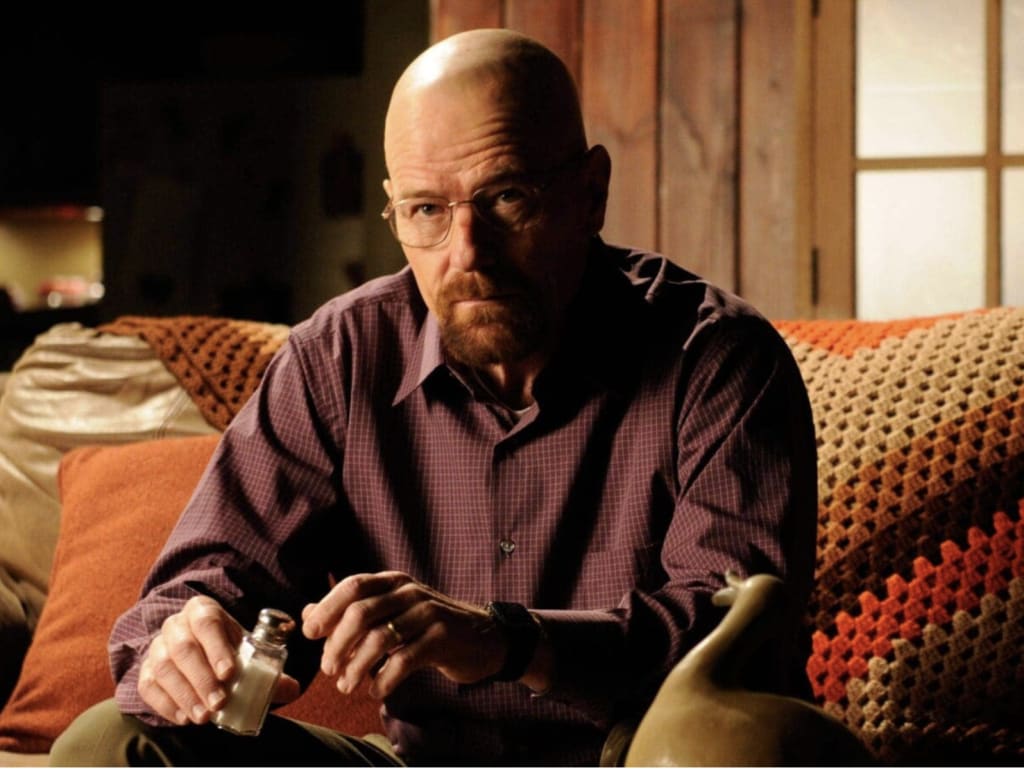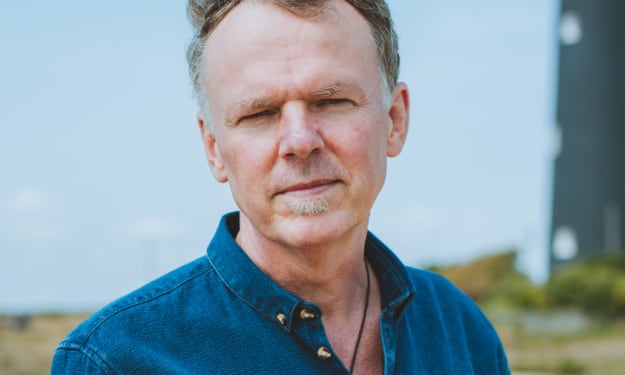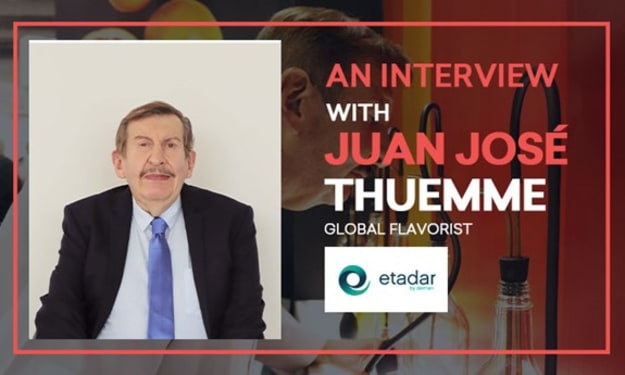Life Lessons From Bryan Cranston
Ten lessons all creatives can learn from the star of Breaking Bad

The life of Bryan
I interviewed Bryan Cranston in 2014, not long after the final series of Breaking Bad had aired.
He was starring in New York as US president Lyndon B Johnston in Robert Schenkkan’s epic play All The Way, a demanding role in which he was on-stage for a full two hours 20 minutes, altering his voice and physiology quite radically to embody the rotund, earthy politician.
It was an extraordinary portrayal that was later to win him a well-deserved Tony award. And creatively, he said it was exactly the challenge he’d been looking for after an intense five years of TV drama.
I’d been told to knock on the stage door of the Broadway theatre mid-afternoon. I’d assumed that a PR or his people would meet me, that I’d then be asked to wait around (I’d bought a book to read).
Instead, a stagehand simply led me to Cranston’s empty, surprisingly shabby dressing room and left me there, with the actor wandering in without any ceremony a few minutes later.
No entourage, no ‘people’, no PR hustling me out after my allotted time was up: just a thoughtful, interesting man who seemed to enjoy sharing what he’d learned in his life as well as in his art.
So here are some lessons from the life of Bryan.
1: Know what you want, creatively. And share that with your team.
To help his agents decide which acting projects he might be interested in, Cranston created a grid which gives points to different aspects of the project, in order of priority.
“First is the story. That has the highest amount of points and as it goes down, the points diminish because story is the most important element for me. Then there’s the text, because sometimes you’ll have a fantastic story, and you read the script and you think, ‘Oh! They missed it.’ Then comes the character I’ll be playing; and then the director, the vision that he or she has towards it, and how they’d be as a collaborator. Because I don’t approach my work as a hired hand. I can’t.
“I’m very fortunate to be in a position where I never have to work again. So if I’m going to work now, it’s not for the money. It’s not that I don’t care at all, but the salary is not on my chart.”
2: Be grateful.
Cranston grew up in Los Angeles, with parents who were struggling actors. “That was an introduction to life for most actors. Ninety per cent of everyone who wants to make a living as an actor comes to a crossroads and has to switch and get a real job. Another nine per cent scrape and scratch and struggle the rest of their lives. One per cent makes a good living. And of that one per cent, maybe 25 per cent of that makes a very good living.
“I’m extremely fortunate. I get to play and create for a living. How many people can say that? I don’t take it for granted, I don’t feel any sense of entitlement. I’m lucky to be here.
“Going onto studio lots with my dad or mom to see things being shot, everything seemed large and grand from a boy’s perspective. To this day, driving through the large circular arches of Paramount… I still get excited!”
3: Adversity can be an advantage.
When he was 12, Cranston’s parents went through a messy divorce. He says the resulting anger and emotional insecurities have been useful to him, as an artist.
“It came at a bad time. At 12 years old, you’re too immature to not think that you had something to do with it. It changed me. It made me insecure and introverted. Before that, I was on a track to be more gregarious and outward, and feeling my way through pretty well. And that shut me down.”
He and his brother spent a year living with their grandparents, on their farm in San Bernardino county.
“We were expected to do chores, and we hated the idea. But it’s like the Stones say: you can’t always get what you want, but you get what you need. We got discipline, order, a sound foundation, and parameters of what we could and couldn’t do. I learned my work ethic from my grandfather and grandmother.”
4: Be positive and celebrate successes, no matter how lowly.
I mentioned an old advert I’d seen online, in which Cranston was advertising haemorrhoid cream, and wonder how he felt about that.
“I didn’t mind doing it,” he shrugs. “It was still storytelling. It was also very pragmatic. Doing half a dozen commercials a year paid for my health insurance, contributed to my pension, it paid almost all my expenses throughout the year and gave me tremendous free time to go to classes, and pay for my photos and work as an actor.
“So I didn’t have any resentment toward it, at all. It was a great gift to come my way.”
5: To succeed, you need talent, patience and persistence. But also luck.
Before Breaking Bad, he was primarily known for his comedy work, as the long-suffering dad in Malcolm In The Middle. Vince Gilligan, who wrote Breaking Bad, had remembered Cranston playing a bad guy sympathetically in an episode of The X-Files years before, and called him in. The rest is TV history.
“There’s no one in the arts who has a successful career without a healthy dose of luck. I would defy anyone to say, ‘No, I earned it all. It was me that opened every door, it was me that carved every opportunity.’ There are always mentors, and there are accidents.”
6: We can’t all be George Clooney — and that’s fine.
While talking about his role in the Oscar-winning 2012 film Argo, I confess that I didn’t even realise Cranston was in it until the credits rolled. Some actors would take offence at this. He laughed in delight.
“I don’t want to be a persona star, like John Wayne. Whether he was wearing a cowboy outfit or a military uniform or whatever, he was always John Wayne. His image was bigger than any character he was playing.
“George Clooney is a great guy, one of our producers on Argo and a terrific actor. But he can’t play the roles that I can play. He’s like Cary Grant, he can only play in that realm — which I’m sure he’s fine with. But I can be more of a chameleon, and that gives me a wider opportunity to choose characters.”
7: How to have a long and happy marriage.
“In this profession, there’s a tremendous amount of travel, I’m working with other women, I’m on location, we’re apart, we’re human — there’s certainly temptation. And as actors, it’s our job to make a connection, to open up. So if you allow it, your guard can come down.
“That’s what you have to be wise about. It comes with age. You say, ‘It’s too much to give up. I have too much appreciation and love for my mate to jeopardise that, so I’m not going to do that.’
“It’s not about saying there isn’t attraction to other people, there isn’t temptation. But it’s about recognising that, being truthful to yourself, and saying, ‘Why am I in a position where I’m now in a bar, and there’s women?’ And then I leave.
“Interestingly, the more attention and fame that comes my way, the less I am in the public eye voluntarily, so when I’m done working, I go home. I don’t put myself in a bar. I don’t like it.”
8: Know when to stop juggling.
“We’re constantly trying to find a balance. How much to myself? How much to my child? How much to my spouse? How much to my house? How much to my neighbours? How much to my parent?
“We’re juggling all the time. When I was a kid, in variety shows there was a guy who had the sticks and the plates — and that’s what we do as adults, we’re constantly spinning all these plates. What I try to do now is not just to keep those sticks going. I want to look at the plate and go, ‘You know what? I don’t need that.’”
9: It’s not always about the stuff.
“We have a beautiful home in Los Angeles, but I want to downsize. We had so much fun there, but now our daughter is starting her own life, and our dog is very old. So my wife and I are engaged in conversation about what we want the next 10, 15, 20 years to be. Instead of having it just happen to us, we want to take the lead, think about it, decide what we really want.
“Even though I’m not mowing my own lawn, cutting the trees or cleaning the pool, you still have to organise it. You’re still actively involved in stuff. And my appreciation for the stuff has diminished. I want to have more experiences than things.
“I’d rather have a dinner party with six friends than a huge party where I say two words to each person. There’s too much energy and effort going out, and not enough enrichment coming back. I just feel exhausted by it.”
10: Sometimes, you just have to get naked.
“There are things in my life, anger issues, or resentment or abandonment issues that I can recall and bring to the surface. The actors who are willing to bare their souls are the ones that more often than not have the ability to portray a fully-realised character.
“But it takes a while for the artist to be able to say, ‘OK here I am, figuratively — and maybe even literally — naked.’ And I’ve done it. In public. I’ve been naked for Breaking Bad, in public places. Talk about a challenge! Here I am, completely naked, extras walking around. It’s like, ‘Wow, there’s nowhere to hide.’”
****
I originally interviewed Bryan Cranston for the Telegraph magazine in the UK.
About the Creator
Sheryl Garratt
Sheryl Garratt is a former editor of The Face and Observer magazines, and has written professionally for more than 30 years. She is also a coach working with creatives of all kinds. Find her at thecreativelife.net






Comments
There are no comments for this story
Be the first to respond and start the conversation.